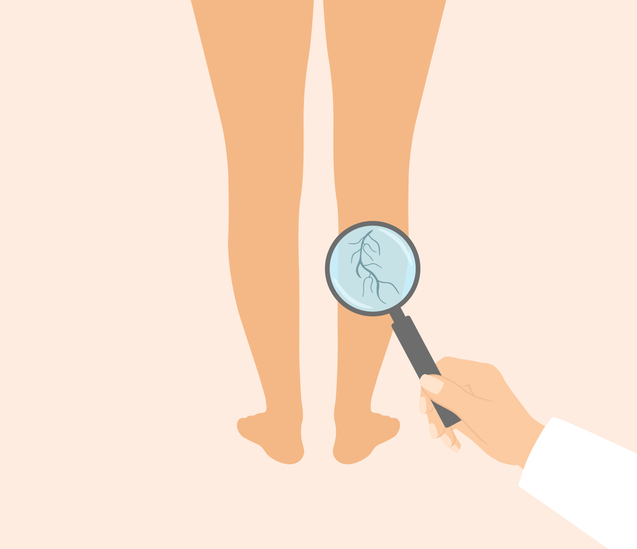Vasculitis
Vasculitis
Vasculitis
When you hear you might have vasculitis, it can feel overwhelming. You may be dealing with swelling, pain, fatigue and other symptoms that are hard to explain. You might also have questions about what the diagnosis means and how it will affect your life.
There are more than 30 types of vasculitis, and most of them are rare, so finding an experienced expert is essential. At Carilion Clinic, you don’t have to face this alone. Our rheumatologists have deep experience caring for people with rare conditions like vasculitis.
We work as a team with other care teams at Carilion to care for your unique needs and create a plan that fits your life. Our goal is to help you feel better, protect your long-term health and support you every step of the way.
When you hear you might have vasculitis, it can feel overwhelming. You may be dealing with swelling, pain, fatigue and other symptoms that are hard to explain. You might also have questions about what the diagnosis means and how it will affect your life.
There are more than 30 types of vasculitis, and most of them are rare, so finding an experienced expert is essential. At Carilion Clinic, you don’t have to face this alone. Our rheumatologists have deep experience caring for people with rare conditions like vasculitis.
We work as a team with other care teams at Carilion to care for your unique needs and create a plan that fits your life. Our goal is to help you feel better, protect your long-term health and support you every step of the way.
Vasculitis is an inflammation of your blood vessels. Your arteries, veins and capillaries are your body’s highway system for blood.
This inflammation can happen when your immune system attacks your blood vessels. When irritated, blood vessels can swell. This swelling means blood can’t flow as it should.
Blood flow issues can cause a range of problems in your body. It causes different symptoms depending on the blood vessels affected. Vasculitis can cause a bulge or weak spot in a blood vessel, called an aneurysm, which can be life-threatening.
We don’t know exactly what causes vasculitis. It can happen because of:
- Infections, like hepatitis B or C
- Another disease, like cancer
- Medicine you’re taking
We can’t cure vasculitis, but medicine helps most people manage the symptoms.
What Is Vasculitis?
Vasculitis is an inflammation of your blood vessels. Your arteries, veins and capillaries are your body’s highway system for blood.
This inflammation can happen when your immune system attacks your blood vessels. When irritated, blood vessels can swell. This swelling means blood can’t flow as it should.
Blood flow issues can cause a range of problems in your body. It causes different symptoms depending on the blood vessels affected. Vasculitis can cause a bulge or weak spot in a blood vessel, called an aneurysm, which can be life-threatening.
We don’t know exactly what causes vasculitis. It can happen because of:
- Infections, like hepatitis B or C
- Another disease, like cancer
- Medicine you’re taking
We can’t cure vasculitis, but medicine helps most people manage the symptoms.
There are many types of vasculitis. Some types affect your large blood vessels, and others affect your small blood vessels.
These different types affect your body in various ways. Many only involve certain blood vessels, but others can affect nearly your whole body.
Some types of vasculitis include:
- Giant cell arteritis: This is one of the most common types of vasculitis. It affects the large blood vessels, mostly in your head and neck. It can cause headaches, vision problems and jaw pain.
- ANCA-associated vasculitis: This is a group of rare conditions that affect your small and medium blood vessels.
- Central nervous system vasculitis: This type affects the blood vessels in your brain and spinal cord. Sometimes it happens along with diseases like rheumatoid arthritis or lupus.
- Polyarteritis nodosa: This type can cause an aneurysm. It can also lead to muscle and joint pain and kidney problems.
- Behçet’s disease: This type can affect your whole body. People with this type often have mouth and genital sores as well as eye inflammation and skin problems.
- Buerger’s disease: This type usually affects the blood flow in your arms and legs.
- Kawasaki disease: This type happens in children under 5, and affects blood vessels throughout the body.
Types of Vasculitis
There are many types of vasculitis. Some types affect your large blood vessels, and others affect your small blood vessels.
These different types affect your body in various ways. Many only involve certain blood vessels, but others can affect nearly your whole body.
Some types of vasculitis include:
- Giant cell arteritis: This is one of the most common types of vasculitis. It affects the large blood vessels, mostly in your head and neck. It can cause headaches, vision problems and jaw pain.
- ANCA-associated vasculitis: This is a group of rare conditions that affect your small and medium blood vessels.
- Central nervous system vasculitis: This type affects the blood vessels in your brain and spinal cord. Sometimes it happens along with diseases like rheumatoid arthritis or lupus.
- Polyarteritis nodosa: This type can cause an aneurysm. It can also lead to muscle and joint pain and kidney problems.
- Behçet’s disease: This type can affect your whole body. People with this type often have mouth and genital sores as well as eye inflammation and skin problems.
- Buerger’s disease: This type usually affects the blood flow in your arms and legs.
- Kawasaki disease: This type happens in children under 5, and affects blood vessels throughout the body.
Vasculitis can affect many different areas and systems in your body. It’s common to start by seeing a specialist associated with the symptoms you’re having.
For example, if you’re having bad headaches, you might see a neurologist. If you’re having eye problems, you might see an eye doctor.
Rheumatologists often see people with vasculitis because we deal with inflammation problems that affect the joints. Many types of vasculitis cause joint pain.
After doing a physical exam and reviewing medical history, tests we order might include:
- Blood tests: To look for signs of inflammation or for certain antibodies
- Angiogram: Similar to an X-ray of your blood vessels
- Organ function tests: To check for organ damage
- Biopsies: To check your tissues for signs of vasculitis
How We Diagnose Vasculitis
Vasculitis can affect many different areas and systems in your body. It’s common to start by seeing a specialist associated with the symptoms you’re having.
For example, if you’re having bad headaches, you might see a neurologist. If you’re having eye problems, you might see an eye doctor.
Rheumatologists often see people with vasculitis because we deal with inflammation problems that affect the joints. Many types of vasculitis cause joint pain.
After doing a physical exam and reviewing medical history, tests we order might include:
- Blood tests: To look for signs of inflammation or for certain antibodies
- Angiogram: Similar to an X-ray of your blood vessels
- Organ function tests: To check for organ damage
- Biopsies: To check your tissues for signs of vasculitis
There’s no cure for vasculitis, but it can go into remission. This means you have a period of time without symptoms.
Your specific treatment will depend on the type of vasculitis you have and if you have other related autoimmune conditions.
At Carilion, we aim to:
- Treat symptoms and prevent them from worsening
- Slow down your body’s inflammatory response
- Prevent or slow damage to your organs
- Help improve your quality of life
Medicines for vasculitis
You may take a mix of medicines to help with your vasculitis symptoms. These medicines can help prevent flare-ups or help ease the pain when you have one.
These medicines include:
- Anti-inflammatories: Can help relieve pain by lowering inflammation.
- Corticosteroids: Help control the inflammation of vasculitis. These drugs can have side effects, so your doctor will manage your dose carefully.
- Immunosuppressants: Help your immune system be less active.
- Blood pressure medicine: Lowers your blood pressure and helps protect your kidneys.
There are other classes of drugs doctors can use to treat vasculitis, including medicines that block certain actions in your body.
Vasculitis surgery
We don’t usually use surgery to treat vasculitis. But if you have a lot of blood vessel damage, there are procedures to help.
If your vasculitis has caused an aneurysm, you might need surgery. Without surgery, large aneurysms can rupture and be life-threatening.
How We Treat Vasculitis
There’s no cure for vasculitis, but it can go into remission. This means you have a period of time without symptoms.
Your specific treatment will depend on the type of vasculitis you have and if you have other related autoimmune conditions.
At Carilion, we aim to:
- Treat symptoms and prevent them from worsening
- Slow down your body’s inflammatory response
- Prevent or slow damage to your organs
- Help improve your quality of life
Medicines for vasculitis
You may take a mix of medicines to help with your vasculitis symptoms. These medicines can help prevent flare-ups or help ease the pain when you have one.
These medicines include:
- Anti-inflammatories: Can help relieve pain by lowering inflammation.
- Corticosteroids: Help control the inflammation of vasculitis. These drugs can have side effects, so your doctor will manage your dose carefully.
- Immunosuppressants: Help your immune system be less active.
- Blood pressure medicine: Lowers your blood pressure and helps protect your kidneys.
There are other classes of drugs doctors can use to treat vasculitis, including medicines that block certain actions in your body.
Vasculitis surgery
We don’t usually use surgery to treat vasculitis. But if you have a lot of blood vessel damage, there are procedures to help.
If your vasculitis has caused an aneurysm, you might need surgery. Without surgery, large aneurysms can rupture and be life-threatening.
From routine care to complex conditions, we’re experts at diagnosing and treating a range of autoimmune problems. People from across Virginia and neighboring states have come to trust Carilion rheumatologists.

Fast referrals
We’ve simplified our referral process and are usually able to get back to you within a week. A Carilion rheumatologist reviews every referral.

Coordinated care
Carilion experts work together to create a care plan for your vasculitis. Your care team may include vascular surgeons, rheumatologists, kidney experts, lung doctors and other specialists.
Why Choose Carilion Clinic?
From routine care to complex conditions, we’re experts at diagnosing and treating a range of autoimmune problems. People from across Virginia and neighboring states have come to trust Carilion rheumatologists.
Health and Wellness

What is Chronic Venous Insufficiency?

Hepatitis ABCs

When Is a Headache Serious?
Get Care at Carilion Clinic
Treating the people of western Virginia for more than 70 years, we’re proud to continue bringing the latest rheumatology treatments to our community. We’re working to make it easier than ever to connect with us and find the care you need.
Get Care at Carilion Clinic
Treating the people of western Virginia for more than 70 years, we’re proud to continue bringing the latest rheumatology treatments to our community. We’re working to make it easier than ever to connect with us and find the care you need.
Get Care at Carilion Clinic
Treating the people of western Virginia for more than 70 years, we’re proud to continue bringing the latest rheumatology treatments to our community. We’re working to make it easier than ever to connect with us and find the care you need.
Get Care at Carilion Clinic
Treating the people of western Virginia for more than 70 years, we’re proud to continue bringing the latest rheumatology treatments to our community. We’re working to make it easier than ever to connect with us and find the care you need.

